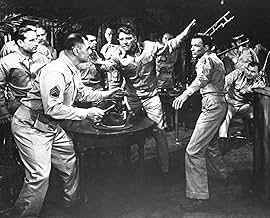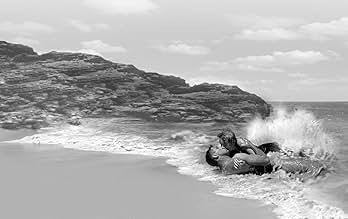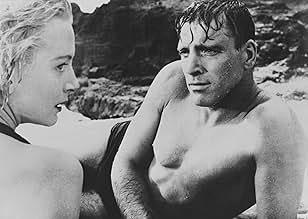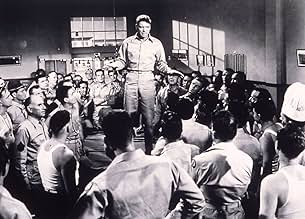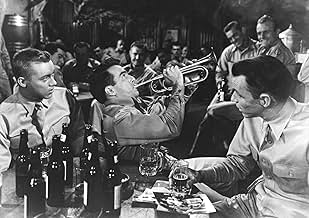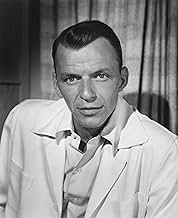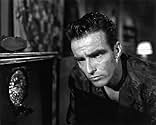À Hawaï, en 1941, un soldat est cruellement puni pour avoir refusé de boxer dans l'équipe de son régiment, tandis que la femme de son capitaine et son adjoint tombent amoureux.À Hawaï, en 1941, un soldat est cruellement puni pour avoir refusé de boxer dans l'équipe de son régiment, tandis que la femme de son capitaine et son adjoint tombent amoureux.À Hawaï, en 1941, un soldat est cruellement puni pour avoir refusé de boxer dans l'équipe de son régiment, tandis que la femme de son capitaine et son adjoint tombent amoureux.
- Réalisation
- Scénario
- Casting principal
- Récompensé par 8 Oscars
- 26 victoires et 9 nominations au total
Claude Akins
- Sgt. 'Baldy' Dhom
- (non crédité)
Vicki Bakken
- Suzanne
- (non crédité)
Margaret Barstow
- Roxanne
- (non crédité)
Avis à la une
In hindsight, this 1953 classic doesn't seem as much a military drama as it does a highly charged soap opera, which shouldn't come as a surprise given that master filmmaker Fred Zinnemann ("the Nun's Story") was at the helm. The veteran director upended the western genre just a year earlier with the Gary Cooper classic "High Noon", and he places the same incendiary focus of character over action here, that is, until the inevitable climax which uses the Japanese attack on Pearl Harbor as a catharsis for the characters' dilemmas now dwarfed by the coming world war.
Based on James Jones' epic novel, screenwriter Daniel Taradash manages to reduce the complexity of the book's themes without trivializing them, and then-offbeat casting enhances the movie immeasurably. Set on a U.S. Army base in Hawaii in the months leading up to the attack, the focus is on two men, both dedicated to the military with no aspirations to become the officers they have grown to detest. One is Private Robert E. Prewitt, a talented boxer (and bugler) who refuses to fight on his regiment's team since blinding a sparring partner. The other is First Sergeant Milton Warden, a take-charge, professional soldier who earns the trust of his men even as he kowtows to his weak-willed commanding officer.
Life in the barracks is fraught with adversarial personalities, chief among them Private Angelo Maggio, Prewitt's loudmouthed best friend, and Staff Sergeant "Fatso" Judson, the sadistic stockade warden. Both Prewitt and Warden meet women who seek to change their lives. Prewitt finds cynical nightclub "hostess" Lorene at a brothel masquerading as a social club, while Warden embarks on a passionate affair with his commanding officer's wayward wife Karen. Burt Lancaster is well cast as Warden, and he brings surprising nuance to his character's clandestine encounters with Karen. However, it's Montgomery Clift - despite looking too slight to be genuinely believable as a boxer - who transcends his loner role by playing off his innately sensitive nature to portray a man who will never sacrifice his honor despite how dire the consequences. Well within his comfort zone, Frank Sinatra's turn as Maggio is small but impactful.
Still two years away from "Marty", Ernest Borgnine makes Judson's malevolence palpable in just a few scenes. Deborah Kerr submerges her Scottish accent and previous lady-like demeanor to reveal the embittered, sexually assertive side of Karen without sacrificing any of the character's vulnerability. The legendary, much-parodied beach scene with Lancaster still sizzles after all these years. Similarly, Donna Reed foregoes her good-girl image (epitomized by her memorable turn as Mary Bailey in "It's a Wonderful Life") to play the sultry, delusional Lorene. The 2003 DVD comes with a small set of extras - a three-minute making-of retrospective short, a nine-minute collection of on-set footage and interviews from a documentary entitled "Fred Zinnemann: As I See It", and the original theatrical trailer. The best extra is the commentary track from Tim Zinnemann (the director's son) and screenwriter Alvin Sargent ("Spider-Man 2"), who had a small role in the movie.
Based on James Jones' epic novel, screenwriter Daniel Taradash manages to reduce the complexity of the book's themes without trivializing them, and then-offbeat casting enhances the movie immeasurably. Set on a U.S. Army base in Hawaii in the months leading up to the attack, the focus is on two men, both dedicated to the military with no aspirations to become the officers they have grown to detest. One is Private Robert E. Prewitt, a talented boxer (and bugler) who refuses to fight on his regiment's team since blinding a sparring partner. The other is First Sergeant Milton Warden, a take-charge, professional soldier who earns the trust of his men even as he kowtows to his weak-willed commanding officer.
Life in the barracks is fraught with adversarial personalities, chief among them Private Angelo Maggio, Prewitt's loudmouthed best friend, and Staff Sergeant "Fatso" Judson, the sadistic stockade warden. Both Prewitt and Warden meet women who seek to change their lives. Prewitt finds cynical nightclub "hostess" Lorene at a brothel masquerading as a social club, while Warden embarks on a passionate affair with his commanding officer's wayward wife Karen. Burt Lancaster is well cast as Warden, and he brings surprising nuance to his character's clandestine encounters with Karen. However, it's Montgomery Clift - despite looking too slight to be genuinely believable as a boxer - who transcends his loner role by playing off his innately sensitive nature to portray a man who will never sacrifice his honor despite how dire the consequences. Well within his comfort zone, Frank Sinatra's turn as Maggio is small but impactful.
Still two years away from "Marty", Ernest Borgnine makes Judson's malevolence palpable in just a few scenes. Deborah Kerr submerges her Scottish accent and previous lady-like demeanor to reveal the embittered, sexually assertive side of Karen without sacrificing any of the character's vulnerability. The legendary, much-parodied beach scene with Lancaster still sizzles after all these years. Similarly, Donna Reed foregoes her good-girl image (epitomized by her memorable turn as Mary Bailey in "It's a Wonderful Life") to play the sultry, delusional Lorene. The 2003 DVD comes with a small set of extras - a three-minute making-of retrospective short, a nine-minute collection of on-set footage and interviews from a documentary entitled "Fred Zinnemann: As I See It", and the original theatrical trailer. The best extra is the commentary track from Tim Zinnemann (the director's son) and screenwriter Alvin Sargent ("Spider-Man 2"), who had a small role in the movie.
... from what we feed on these days and perhaps only of relevance as an artefact of the time it was released and the period it reflects, the way we behave and interact in the real world has changed unrecognisably since. It does, however, deliver us some top drawer performances from some genuinely talented performers, most of them to go on to much bigger and better things. All in all, a solid 1950s era film set in the prior decade before the outbreak of war, it uses multiple and interlinked sub plots to show us the sorrow and sadness experienced by numerous characters as a result of the choices they've made, the people they met and how they interacted.
I really enjoyed this film. Frank Sinatra walked away with the Oscar, but I thought Montgomery Clift's performance was the standout. I know they weren't competing against one another, but if any actor were to win an Oscar I would have preferred Clift. Lancaster and Kerr gave the other great performances. I liked the interaction between Clift's and Lancaster's characters, particularly in the scene when Lancaster is telling Clift he could avoid fatigue duties 'if he were smart'. Clift replies 'Yeah, but I ain't smart', and Lancaster says 'I know, I know but if you were...'
I thought the best parts of this film came from the great acting of Kerr, Lancaster and Clift. It may suffer from being called a classic, making people's expectations high, but I thought it was very enjoyable.
I thought the best parts of this film came from the great acting of Kerr, Lancaster and Clift. It may suffer from being called a classic, making people's expectations high, but I thought it was very enjoyable.
One of the big blockbuster best sellers of the post World War II years is James Jones's From Here to Eternity, a tale of the peacetime army in Hawaii before Pearl Harbor. The book was definitely going to be made into a film and it was only a question of casting to make it a success.
Director Fred Zinneman had a good intuitive sense about casting here, even against type. The two principal female parts were done against type. Deborah Kerr who made a career of playing respectable women played a captain's wife who's drinking and playing around. Not that husband Philip Ober is letting grass grow under his feet either, but Kerr's latest sexual exploit involves her with the First Sergeant of her husband's company, Burt Lancaster.
Donna Reed, who up to that point was best known for being Mary Bailey in It's A Wonderful Life, plays a prostitute here. A girl from the wrong side of the tracks, jilted by a rich boyfriend stateside, she's in Hawaii to make money and then go home and buy some respectability. She's not looking for romance with any soldiers, but you can't plan these things.
Especially Montgomery Clift if he comes in your life. It's been argued that this is Clift's greatest role and a case can sure be made for it. His character of Robert E. Lee Pruitt is like so many who still join the army today, from small town America who have no future there and find a home in the Armed Services. What makes Clift unique is that strong sense of individualism he can't control in an organization that does not encourage individuality.
Clift and Lancaster are a great study in contrasts and that's what drives From Here to Eternity. Lancaster as Sergeant Milt Warden is the ultimate professional soldier, held in the highest regard by his men. Lancaster is someone who knows how to work the system, you see it in the way he manipulates his captain. Of course he's got to be a manipulator there since he's having an affair with Deborah Kerr. He tries to protect Clift from himself and ultimately fails.
Clift has transferred into an infantry company and he was at one time a boxer. But he blinded someone in a fight and quit boxing. Philip Ober who prides himself on having several champions in various weight classes worked to get Clift in his company. Clift upsets his plans by refusing to box so he has the various sergeants give him "the treatment."
Clift's best friend in the company is a tough street wise soldier from the big city named Angelo Maggio, played by Frank Sinatra. Sinatra read the book and knew this part was for him. He did everything he had to do to get that part, including working for scale. At the time Sinatra was considered a has been as singer and actor. Sinatra was right on the money in terms of picking a role. His faith in himself and Columbia Pictures and Fred Zinneman's faith in him netted him an Oscar for Best Supporting Actor, one of eight awards won by From Here to Eternity.
By the way Sinatra credited both Lancaster and Clift in helping him through this film as a dramatic actor. Lancaster and Sinatra didn't inhabit the same Hollywood orbit, but they remained friends for life. The same could not be said for Clift. Allegedly, some five or six years after From Here to Eternity and after Monty Clift's automobile accident while shooting Raintree County, Clift at some party at Sinatra's made a drunken pass at one of Sinatra's retainers. That got him kicked out of Sinatra's circle permanently.
In fact From Here to Eternity was also the Best Picture of 1953, with Zinneman getting his second Best Director Oscar in a row after the one he took home in 1952 for High Noon. Donna Reed won for Best Supporting Acress. Burt Lancaster and Montgomery Clift were both nominated for Best Actor, but split the vote allowing William Holden to win for Stalag 17. Another great acting job itself. And Kerr was up for Best Actress, but lost to Audrey Hepburn for Roman Holiday.
From Here to Eternity is a film loaded with good actors in small roles who got their first notice in this film. Ernest Borgnine, Robert J. Wilkie, Claude Akins, Jack Warden, Mickey Shaughnessy, all play various soldiers and each one is memorable. Especially Borgnine as the vicious sadistic sergeant of the stockade.
TV's Superman was in From Here to Eternity also. George Reeves who was looking to escape the typecasting from Superman has a part as another sergeant who warns Lancaster about Deborah Kerr. He gave a fine performance, but most of it wound up on the cutting room floor. That would have unforeseen tragic consequences.
This is not any kind of glamorous army. These people are all too real and not very noble. The original novel was toned down quite a bit for the screen. But when the attack on Pearl Harbor comes, the men rise to the occasion, do their jobs in a more than competent manner and led by Burt Lancaster in that company. It's these men who won that war in the Pacific and the one in Europe as well and From Here to Eternity despite the less than noble portrayals of them as individuals is a great tribute to them as a team.
Director Fred Zinneman had a good intuitive sense about casting here, even against type. The two principal female parts were done against type. Deborah Kerr who made a career of playing respectable women played a captain's wife who's drinking and playing around. Not that husband Philip Ober is letting grass grow under his feet either, but Kerr's latest sexual exploit involves her with the First Sergeant of her husband's company, Burt Lancaster.
Donna Reed, who up to that point was best known for being Mary Bailey in It's A Wonderful Life, plays a prostitute here. A girl from the wrong side of the tracks, jilted by a rich boyfriend stateside, she's in Hawaii to make money and then go home and buy some respectability. She's not looking for romance with any soldiers, but you can't plan these things.
Especially Montgomery Clift if he comes in your life. It's been argued that this is Clift's greatest role and a case can sure be made for it. His character of Robert E. Lee Pruitt is like so many who still join the army today, from small town America who have no future there and find a home in the Armed Services. What makes Clift unique is that strong sense of individualism he can't control in an organization that does not encourage individuality.
Clift and Lancaster are a great study in contrasts and that's what drives From Here to Eternity. Lancaster as Sergeant Milt Warden is the ultimate professional soldier, held in the highest regard by his men. Lancaster is someone who knows how to work the system, you see it in the way he manipulates his captain. Of course he's got to be a manipulator there since he's having an affair with Deborah Kerr. He tries to protect Clift from himself and ultimately fails.
Clift has transferred into an infantry company and he was at one time a boxer. But he blinded someone in a fight and quit boxing. Philip Ober who prides himself on having several champions in various weight classes worked to get Clift in his company. Clift upsets his plans by refusing to box so he has the various sergeants give him "the treatment."
Clift's best friend in the company is a tough street wise soldier from the big city named Angelo Maggio, played by Frank Sinatra. Sinatra read the book and knew this part was for him. He did everything he had to do to get that part, including working for scale. At the time Sinatra was considered a has been as singer and actor. Sinatra was right on the money in terms of picking a role. His faith in himself and Columbia Pictures and Fred Zinneman's faith in him netted him an Oscar for Best Supporting Actor, one of eight awards won by From Here to Eternity.
By the way Sinatra credited both Lancaster and Clift in helping him through this film as a dramatic actor. Lancaster and Sinatra didn't inhabit the same Hollywood orbit, but they remained friends for life. The same could not be said for Clift. Allegedly, some five or six years after From Here to Eternity and after Monty Clift's automobile accident while shooting Raintree County, Clift at some party at Sinatra's made a drunken pass at one of Sinatra's retainers. That got him kicked out of Sinatra's circle permanently.
In fact From Here to Eternity was also the Best Picture of 1953, with Zinneman getting his second Best Director Oscar in a row after the one he took home in 1952 for High Noon. Donna Reed won for Best Supporting Acress. Burt Lancaster and Montgomery Clift were both nominated for Best Actor, but split the vote allowing William Holden to win for Stalag 17. Another great acting job itself. And Kerr was up for Best Actress, but lost to Audrey Hepburn for Roman Holiday.
From Here to Eternity is a film loaded with good actors in small roles who got their first notice in this film. Ernest Borgnine, Robert J. Wilkie, Claude Akins, Jack Warden, Mickey Shaughnessy, all play various soldiers and each one is memorable. Especially Borgnine as the vicious sadistic sergeant of the stockade.
TV's Superman was in From Here to Eternity also. George Reeves who was looking to escape the typecasting from Superman has a part as another sergeant who warns Lancaster about Deborah Kerr. He gave a fine performance, but most of it wound up on the cutting room floor. That would have unforeseen tragic consequences.
This is not any kind of glamorous army. These people are all too real and not very noble. The original novel was toned down quite a bit for the screen. But when the attack on Pearl Harbor comes, the men rise to the occasion, do their jobs in a more than competent manner and led by Burt Lancaster in that company. It's these men who won that war in the Pacific and the one in Europe as well and From Here to Eternity despite the less than noble portrayals of them as individuals is a great tribute to them as a team.
The folks who made PEARL HARBOR should have done their homework on how to bring a personal romance into a historical event. This film should have been at the top of their list.
The Pearl Harbor attack is the climax of the film as well as of the various intricate human relationships in the film. This is a classic piece of romantic history, and the beach scene is probably one of the most erotic ever done -- all the more impressive because it has no nudity.
This is a real saga of human passion and how it is affected by history. Whether you see PEARL HARBOR or not is up to you. But definitely see this film.
The Pearl Harbor attack is the climax of the film as well as of the various intricate human relationships in the film. This is a classic piece of romantic history, and the beach scene is probably one of the most erotic ever done -- all the more impressive because it has no nudity.
This is a real saga of human passion and how it is affected by history. Whether you see PEARL HARBOR or not is up to you. But definitely see this film.
Oscars Best Picture Winners, Ranked
Oscars Best Picture Winners, Ranked
See the complete list of Oscars Best Picture winners, ranked by IMDb ratings.
Le saviez-vous
- AnecdotesMontgomery Clift threw himself into the character of Prewitt, learning to play the bugle (even though he knew he'd be dubbed) and taking boxing lessons. Fred Zinnemann said, "Clift forced the other actors to be much better than they really were. That's the only way I can put it. He got performances from the other actors, he got reactions from the other actors that were totally genuine."
- GaffesThe impromptu bugle solo in the club includes notes that only a trumpet could hit.
- Citations
Robert E. Lee "Prew' Prewitt: Nobody ever lies about being lonely.
- Crédits fousOpening credits prologue: SCHOFIELD BARRACKS HAWAII 1941
- ConnexionsEdited from Pearl Harbour (1943)
- Bandes originalesRe-enlistment Blues
(1953)
by James Jones, Fred Karger, Robert Wells
Sung by men in the barracks twice
Played often in the score
Meilleurs choix
Connectez-vous pour évaluer et suivre la liste de favoris afin de recevoir des recommandations personnalisées
Détails
- Date de sortie
- Pays d’origine
- Langue
- Aussi connu sous le nom de
- De aquí a la eternidad
- Lieux de tournage
- Halona Beach Cove, O'ahu, Hawaï, États-Unis(Warden and Karen's kissing in the surf scene)
- Société de production
- Voir plus de crédits d'entreprise sur IMDbPro
Box-office
- Budget
- 1 650 000 $US (estimé)
- Montant brut aux États-Unis et au Canada
- 36 416 $US
- Week-end de sortie aux États-Unis et au Canada
- 18 176 $US
- 7 déc. 2003
- Montant brut mondial
- 36 416 $US
- Durée
- 1h 58min(118 min)
- Couleur
- Mixage
- Rapport de forme
- 1.37 : 1
Contribuer à cette page
Suggérer une modification ou ajouter du contenu manquant



